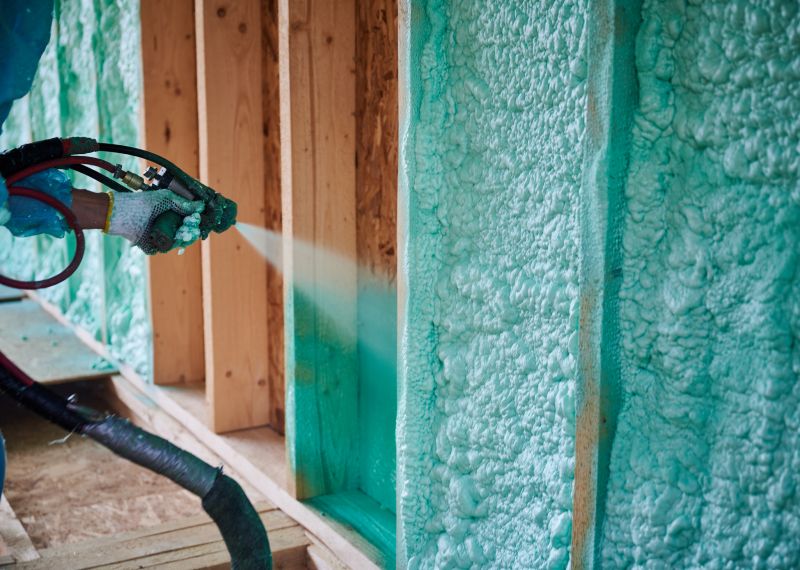Leading Insulation Service Products For Better Results
Identify essential products that help achieve thorough insulation coverage and long-lasting performance.
 When considering insulation services in Abilene, TX, selecting the right products is essential for achieving effective thermal management and energy efficiency. Insulation products come in various forms, each suited to specific applications and building types. From residential attics to commercial walls, the right insulation can help maintain comfortable indoor temperatures and reduce energy costs. It is important to evaluate factors such as R-value, installation method, and material compatibility to ensure the chosen products meet the specific needs of your project.
When considering insulation services in Abilene, TX, selecting the right products is essential for achieving effective thermal management and energy efficiency. Insulation products come in various forms, each suited to specific applications and building types. From residential attics to commercial walls, the right insulation can help maintain comfortable indoor temperatures and reduce energy costs. It is important to evaluate factors such as R-value, installation method, and material compatibility to ensure the chosen products meet the specific needs of your project.
Top Overall Option
Spray Foam Insulation
Spray foam insulation is a versatile material that expands upon application, filling gaps and creating an effective air barrier. It offers high R-value per inch and excellent adhesion to various surfaces, making it suitable for both residential and commercial projects. Properly installed spray foam can improve energy efficiency and help reduce drafts. When selecting spray foam, consider professional application to ensure safety and optimal performance.
Types of Products For Insulation Service
Fiberglass Batts and Rolls
Pre-cut or roll-form fiberglass insulation that is easy to install in walls, attics, and floors.
Loose-Fill Insulation
Material like cellulose or fiberglass that can be blown into attics and wall cavities for even coverage.
Spray Foam Insulation
Expanding foam applied with specialized equipment, providing air sealing and high thermal resistance.
Rigid Foam Boards
Solid panels made from polystyrene, polyisocyanurate, or polyurethane, suitable for walls, roofs, and foundations.
Reflective or Radiant Barrier Insulation
Materials with reflective surfaces that reduce heat transfer by radiation, often used in attics.
Mineral Wool Insulation
Fire-resistant insulation made from natural or synthetic mineral fibers, used for soundproofing and thermal insulation.
Foam Board Insulation
Lightweight panels ideal for insulating exterior walls, basements, and crawl spaces.
Insulation Foams and Sealants
Spray or foam-based sealants for sealing gaps, cracks, and joints around windows, doors, and wiring.
Reflective Insulation Sheets
Thin reflective materials that can be installed in attics or walls to reflect radiant heat.
Eco-friendly Insulation Materials
Insulation options made from recycled or natural materials, suitable for those seeking sustainable solutions.
Popular Choices
Widely used for ease of installation and affordability in residential projects.
Commonly used for attic insulation, offering good coverage and thermal performance.
Popular for air sealing and insulation in gaps and hard-to-reach areas.
Preferred for insulating basement walls and exterior applications.
Effective in attics for reducing radiant heat transfer.
Chosen for fire resistance and soundproofing qualities.
Versatile and easy to cut for various insulation needs.
Increasingly popular for its high R-value and air sealing capabilities.
Useful for sealing small gaps and preventing air leaks.
Growing in popularity among homeowners seeking sustainable options.
Proper insulation installation involves selecting materials that are appropriate for the climate and building structure. In Abilene, where temperature fluctuations are common, high-quality insulation materials can provide consistent performance. Additionally, understanding the differences between loose-fill, batt, spray foam, and rigid board insulations can help in making informed decisions. Each type offers unique advantages and considerations, making it essential to match the product to the application for optimal results.
Professional insulation services often utilize a combination of these products to maximize effectiveness. For example, spray foam can be used to seal gaps and provide air barriers, while batt or loose-fill insulations can fill larger cavities. Ensuring proper installation is just as important as choosing the right product, as even the best materials can underperform if not installed correctly. Consulting with local experts in Abilene can help identify the most suitable insulation solutions tailored to the specific building and climate conditions.
Ultimately, investing in quality insulation products and professional installation can contribute to improved energy efficiency, comfort, and potentially lower utility bills. By understanding the options available and considering the unique needs of your property, you can select the most appropriate insulation products for your project in Abilene, TX.
Key Buying Considerations
- Determine the appropriate R-value for your climate zone to ensure adequate thermal resistance.
- Consider the application area, such as walls, attics, floors, or crawl spaces, to select the most suitable product type.
- Evaluate the ease of installation and whether professional help is needed for certain materials like spray foam.
- Check compatibility with existing building materials to prevent issues like moisture buildup or material degradation.
- Assess the fire resistance rating of the insulation material, especially for areas with strict safety codes.
- Consider the long-term durability and whether the insulation may settle or degrade over time.
- Review the potential for air sealing and whether the product can contribute to reducing drafts.
- Investigate the moisture resistance properties of the insulation, particularly for areas prone to dampness.
- Think about soundproofing requirements if insulation will be used in shared or noisy spaces.
- Compare installation costs and labor requirements to budget effectively.
- Look into any local building codes or regulations that may influence product choice.
- Consider environmental factors like off-gassing or chemical treatments if relevant.
- Evaluate the availability of the product locally in Abilene, TX, for timely and cost-effective procurement.
- Check for compatibility with existing insulation or building components to avoid installation issues.
